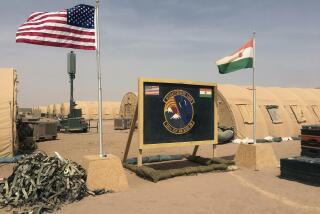Goodby to All That: The Sad Lessons of Somalia : As the last of the U.S troops leave, what have we learned?
- Share via
The last American troops are scheduled to leave Somalia Friday, in advance of President Clinton’s March 31 deadline. They will leave that nation as they found it: a poor and bitterly divided East African country, one that probably will erupt in violence again.
For better or worse, the ravages of Somalia are no longer America’s problem. They are Somalia’s. We have kept our part of the bargain: U.S. troops stopped the starvation, as President George Bush promised when he sent them on a humanitarian mission 16 months ago.
American troops--in a U.N. operation with thousands of soldiers from other Western nations, Asia and Africa--had to start the rebuilding process without disarming Somalia’s contending factions. Not so easy. An abundance of weapons and munitions--the legacy of misguided Cold War largess from the Soviet Union and the United States--had made possible a violent escalation of ancient clan rivalries, and the already grim situation was exacerbated by the patronage-plagued dictatorship of Mohamed Siad Barre.
AMERICAN FUTILITY: U.N. Secretary General Boutros Boutros-Ghali tried to turn the peacekeeping mission into a peace-enforcement mission when the shooting resumed. However, enforcing the peace in Mogadishu, which had become the Horn of Africa’s Dodge City, was impossible without disarming the Somalis. The Clinton Administration was reluctant to commit U.S. lives to the dangerous mission of ferreting out caches of weapons. Although understandable, that reluctance made all the difference, as the futile U.S. effort to capture one major warlord, Mohammed Farah Aidid, sadly proved.
Aidid’s October attack on American troops turned the tide among the American public; news photos of snarling mobs dragging a dead American serviceman through the streets of Mogadishu heightened popular demand to bring U.S. troops home. In response, Clinton set a deadline that provided ample time for Somali leaders to return to the table and negotiate. But the stubborn power-mongers, particularly Aidid, would not be prodded--and the opportunity to take away their guns had been missed.
THIRD-WORLD SOLUTION: Now, as the United States exits Somalia, the Americans leave behind a U.N. peacekeeping force dominated by Third World troops, including Pakistanis, Indians and Egyptians. They offer, at least in theory, advantages that may make their attempts to mediate more acceptable to Somalis: Some religious beliefs and cultural ways are shared. If they succeed, the precedent could get the United Nations off the hook in other regional conflicts. If the major powers are reluctant to commit troops to peacekeeping operations, Boutros-Ghali may be able to persuade smaller, neighboring nations to volunteer forces.
Obviously, the United Nations will have to pick and choose where to send peacekeeping forces; options will be very limited without the resources that the United States can bring to bear. By the same token if the United States always hesitates, that could lead to widespread international instability. As in Bosnia, local conflicts could become terrible and intractable problems with huge death tolls--and far-ranging implications.
Clearly the United States cannot afford to return to trying to be the world’s policeman. America cannot intervene everywhere. But neither should the Clinton Administration always sit on the sidelines. When and where and how to intervene must be determined the hard way--on a case-by-case basis.
Was U.S. intervention worthwhile in Somalia? The outlook for the African nation is mixed. Farming has resumed--a huge gain. On the other hand, the winter crop is not as good as expected and the yield will be lost if fighting flares again and farmers must flee. Also, talks between Somali leaders, including Aidid and a major rival, Mohammed Ali Mahdi, collapsed Wednesday. The failure of the negotiations--held under U.N. auspices in Kenya--raises the question of whether Somalis are ready to agree to any deal that returns a semblance of government and stability to Mogadishu. Their salvation is now up to them.
More to Read
Sign up for Essential California
The most important California stories and recommendations in your inbox every morning.
You may occasionally receive promotional content from the Los Angeles Times.













